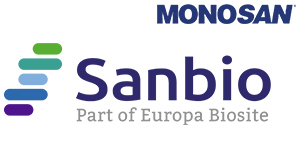Mouse anti-CD123, clone BR4MS (monoclonal)
Mouse anti-CD123, clone BR4MS (monoclonal)
SKU
SANMONX11130
Packaging Unit
1 ml
Manufacturer
Sanbio / Monosan
Availability:
loading...
Price is loading...
Clone Number: BR4MS
Immunogen: Prokaryotic recombinant protein corresponding to 101 amino acids of the external domain of the human CD123 molecule.
Concentration: Greater than or equal to 90 mg/L
Storage buffer: Tissue culture supernatant with 15mM sodium azide
Additional info: The CD123 antigen is also known as the alpha subunit of the human interleukin-3 receptor. It is a type I transmembrane glycoprotein and is a member of the cytokine receptor superfamily. CD123 forms a heterodimer with CD131 (the beta subunit of the interleukin-3 receptor) to form the interleukin-3 receptor, where the cytokine specificity is provided by the alpha subunit and the signal transduction function is provided by the beta subunit. The interleukin-3 receptor is reported to be expressed on monocytes, neutrophils, basophils, eosinophils, megakaryocytes, erythroid precursors, mast cells, macrophages and a subpopulation of B cells, where it mediates proliferation and differentiation of these cells. Outside the hematopoietic system CD123 is reported to be expressed in Leydig cells of the testis, some endothelial cells, and cells of the placenta and brain.
References: Garnache–Ottou F et al. British Journal of Haematology. 2007; 136:539–548/Moretti S et al. J.of Biol.Regulators and Homeostatic Agents. 2001; 15:98–100
Immunogen: Prokaryotic recombinant protein corresponding to 101 amino acids of the external domain of the human CD123 molecule.
Concentration: Greater than or equal to 90 mg/L
Storage buffer: Tissue culture supernatant with 15mM sodium azide
Additional info: The CD123 antigen is also known as the alpha subunit of the human interleukin-3 receptor. It is a type I transmembrane glycoprotein and is a member of the cytokine receptor superfamily. CD123 forms a heterodimer with CD131 (the beta subunit of the interleukin-3 receptor) to form the interleukin-3 receptor, where the cytokine specificity is provided by the alpha subunit and the signal transduction function is provided by the beta subunit. The interleukin-3 receptor is reported to be expressed on monocytes, neutrophils, basophils, eosinophils, megakaryocytes, erythroid precursors, mast cells, macrophages and a subpopulation of B cells, where it mediates proliferation and differentiation of these cells. Outside the hematopoietic system CD123 is reported to be expressed in Leydig cells of the testis, some endothelial cells, and cells of the placenta and brain.
References: Garnache–Ottou F et al. British Journal of Haematology. 2007; 136:539–548/Moretti S et al. J.of Biol.Regulators and Homeostatic Agents. 2001; 15:98–100
| SKU | SANMONX11130 |
|---|---|
| Manufacturer | Sanbio / Monosan |
| Manufacturer SKU | MONX11130 |
| Package Unit | 1 ml |
| Quantity Unit | STK |
| Reactivity | Human |
| Clonality | Monoclonal |
| Application | Immunohistochemistry (paraffin) |
| Isotype | IgG2b |
| Host | Mouse |
| Conjugate | Unconjugated |
| Product information (PDF) | Download |
| MSDS (PDF) |
|

 Deutsch
Deutsch







